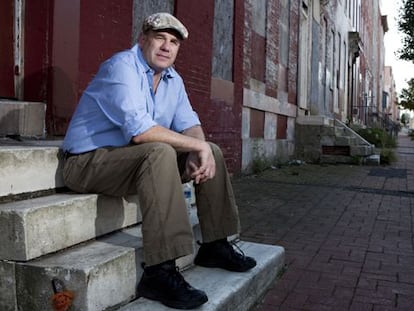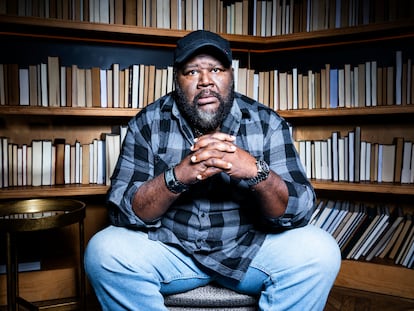Dennis Lehane, author: ‘Race has defined America from the beginning. It’s the sin that we cannot overcome’
A screenwriter and legend of crime fiction, Lehane last year published his 15th book, returning to his hometown: Boston. The author of hits that have been adapted to film – such as ‘Mystic River’ or ‘Shutter Island’ – and the creator of several characters in the legendary TV series ‘The Wire’ has recovered a story from the 1970s about racial segregation
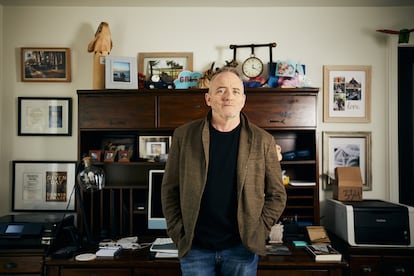
Dennis Lehane, 58, says that, in his novels, he avoids — at all costs — writing about two people sitting in a kitchen talking about their lives. However, it’s at the Boston-born author’s kitchen table in Venice, California, where he chooses to talk about his latest book, Small Mercies (2023).
This is Legane’s 15th work, which he began writing back in 1994. Over the past three decades, the bestselling writer has become one of the biggest names in crime fiction, as well as a successful screenwriter for series such as Black Bird.
Small Mercies has had an exceptional reception in the United States. “It was a very pleasant book to write… but it’s not a pleasant book to read. I was exorcising something, but I didn’t really know what it was… until, finally, I realized that it was rage. I’ve carried it with me since I was nine-years-old,” Lehane tells EL PAÍS.
Set in his native Boston, the novel is one of his most autobiographical works. He uses the Boston desegregation busing crisis as a backdrop — a policy that a district judge decreed in 1974, as a means to end segregation in the city’s public schools. The zip codes with the most Black students were told to send several students to white schools… and vice-versa.
During the hot summer before the school year began, the decision sparked a backlash that spiked racial tensions in the working-class city. In the book, the Irish mafia boss — the much-feared Whitey Bulger — was one of the leaders of the anti-Black riots. Finally captured in Santa Monica in 2011, the criminal inspired Jack Nicholson’s character in The Departed (2006), by Martin Scorsese. The same legendary director later brought Shutter Island (2010) to the big screen… a film based on Lehane’s book.
The love affair between the writer’s work and cinema began early, when, in 2003, Clint Eastwood adapted Mystic River. Today, Lehane believes that he’s ready to direct his own movies, after having learned from these masters of cinema.
Question. You were nine-years-old when the bussing crisis occurred, in an attempt to desegregate school districts. What do you remember from those days?
Answer. A lot. Nine-years-old are very [special]. I’ve noticed it with my daughters. That age is the first major breakaway from narcissism. You begin to see the world and understand that you’re part of something bigger. When I started writing this book, the first part of the research was actually a fact-check: did this really happen? Is that how it happened? Much of this was in the photographs taken by Eugene Richards. When I saw them again, I said, “Yeah, okay, that’s what I saw.” It was mostly graffiti. I never forgot it. They said “KKK [the acronym for the Ku Klux Klan], kill all the n******…”, “go back to Africa.” All over the city of Boston, but especially in Dorchester, where I lived…
Q. In one of the protests, you were trapped in a car.
A. Yes, it was a demonstration, but it felt like it was a riot. My father was driving us home and it was the route we always took. After crossing a bridge, we turned right… but for some reason, we couldn’t. We ended up in the middle of the protest. It was huge, [there were people] for nine blocks. We had to drive through the crowd — they hit our car. Crazy and very scary.
Q. Is that your first political memory?
A. It was. Back then, I thought: “why do we fight each other?” And I remember one specific idea very well, although I’m sure it wasn’t as articulate at the time: people with money have the greatest interest in having those without money fight among themselves. Seeing this issue through this prism has allowed me to understand it from several points of view. On the one hand, there were the African-American students, who had been prevented from accessing [white] schools for nine years in a row. South Boston was at the forefront of blocking any attempts at integration between 1965 and 1974. There were a lot of racist people there, no doubt. There was also a group — one that my father was a part of — who knew that this wasn’t just another case in which we were being told what to do. Rather, [they were aware] that we would be guinea pigs in a social experiment.
Q. How important was this episode for Boston?
A. It was huge. When I made Gone, Baby, Gone (2007) with Ben Affleck, we talked on the set. He told me: “Hey, when are they going to make something about the busing crisis?” No one can understand Boston if they don’t understand that moment. It affected you if you grew up in the city, not the suburbs. It was a seismic event. It changed so many things... it’s the reason why many white working class people don’t read The Boston Globe. It’s the reason why the white working class moved towards the Republican Party and Reagan. The reason why so many kids ended up in Catholic schools. The worst thing of all is that the schools are even more segregated today.
Q. This experience has clearly stayed with you since childhood. When did you know that you wanted to write a book about it?
A. It was in New Orleans. I was directing a television show and I hadn’t written prose for three or four years. The pressure on production — in the times of COVID –— began to rise.
There were daily thunderstorms that forced us to stop. A merciless heat, a hurricane… everything that could go wrong. I needed some sanity.
I started thinking about a woman. I once saw this woman beat up a guy in a bar. “Who was she?” I thought. Then, I heard this story about a woman from Mexico who hunted down the cartel members who had killed her daughter. I was thinking about that and a movie I love from the 1970s: Get Carter. I’d been looking for a Boston story for 15 years and I thought: what if I put [a woman like this] in the summer of 1974?
Q. Were you tempted to use mobster Whitey Bulger as a character? There’s one who’s clearly based on him.
A. No. I’ve always resisted any job that has to do with those guys. I’ve met several [mobsters] — there’s a stature that’s given to them that they don’t deserve. They got an entire generation hooked on heroin. They’re not fucking Vito Corleone. There’s no honor in this story. They’re dirty and ambitious guys who enslaved many people to drugs. I’m not interested in ennobling them in the least. And, above all, they were informants. I’m from a neighborhood where you don’t talk to the police. If you’re a rat, you’re the worst of the worst.
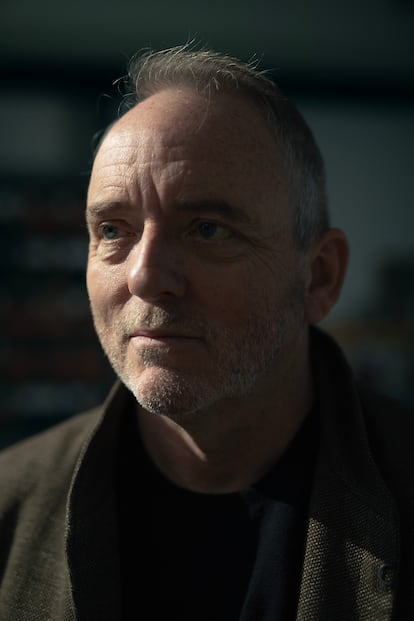
Q. In a strange coincidence, you and Bulger used to drink at the same bar in Santa Monica.
A. The night he was caught, he was at Sonny McLean’s Irish Pub. Everyone was talking about him. He was very strange. A guy who knew him and ran into him often told me that what stood out most about [Bulger] was that he was the most racist person you could meet. He just talked about how much he hated Black people.
Q. In 2017, when talking about the busing crisis at a university commencement address, you used the word “n******,” while referencing the phrases chanted by white racists in Boston.
A. I wasn’t within my right to use that word if I offended any African Americans. [However] if I offended some woke baby who pays for his education with a trust fund, I don’t give a damn. Let him find a safe space somewhere else. I was trying to give context. It meant that those old days weren’t good. Don’t tell me about that golden past that Fox News sells every day. Of course it was wonderful for white people… I got carried away and made a mistake, but I apologized immediately.
Q. Your character in Small Mercies – Mary Pat – uses this word a lot. Was it a way to digest the episode?
A. Could be. I think a lot of what I said on stage was missed because I used the slur.
The speech got a standing ovation for five minutes… but all that was said about it afterwards was that I used the N-word. Part of me thought they missed the point.
People have to understand how bad things were when people didn’t speak in code. It’s the same situation today. Nothing has changed. The children of these racists will still be racist… but they know how to put [their racism] into code. I was very firm with the language. I had a lot of fights with my editor about this [regarding the book]. I told him I wasn’t going to remove it. That’s what people said. I know, because I lived it.
Q. Your book has been released at a time when the United States is seeing several rights overturned by court decisions.
A. It’s a horrible moment. It’s scary… but I can’t say I’m surprised. I lived with this and I’ve always known it was an undercurrent. There were people who thought that, with Obama, we had entered a post-racial stage. Were they nuts? Race has defined this country from the beginning. It’s the original sin that we cannot overcome. I’ve spent a lot of time in the South, where they call the Civil War a “conflict about states’ rights.” They live in total denial. The Trump years shocked me because of the racism hidden behind a thin veil.
Q. You’ve described your childhood as basically being in Ireland in the 1930s — very traditional values. You’re the youngest of five children, with two of you dedicated to the arts.
What was it like growing up in your house?
A. Many assume that my parents were opposed to me being a writer. Not at all. They always supported me. My father was very anti-racist at home, even though he had the basic racism of that generation. He would get angry if the neighbor sold his house to a Black family, because it would lower the value of the property. That kind of thing. But I admire him a lot. He would say at the table — during the busing crisis — that there was no reason to hate anyone because of their skin color.
My father’s dream was for me to work for the utility company. When I had five books published, he would still let me know that the postal service was hiring.
Q. What impact do your characters leave on you mentally?
A. None. Not anymore. That peaked with Shutter Island and Mystic River. Those were two really hard blows. [While writing, I did feel that my closeness to the characters] was harming me. In Mystic River, I had to get inside the head of a man who was attracted to children. It was brutal. While writing Shutter Island, I had to get into the head of a man who had lost his mind and had had a nervous breakdown because he had done a horrible thing.
Q. What changed?
A. You become more professional. At a certain point, you no longer need cigarettes or whiskey to finish. In my early years, it was a pack of American Spirit and a six-pack of Budweiser beer — that’s how I wrote. But back then, I mentally went to dark places. I didn’t understand my psyche very well. And, above all, I didn’t understand the stories at all. Nowadays, I’m older and I’ve worked a lot.
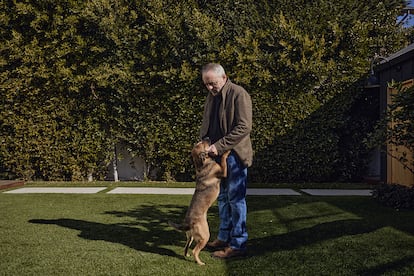
Q. You once said that if the job comes out easy, you’ve done something wrong.
A. I still believe it. This book flowed very well, but I will say that, emotionally, it took me into some very dark corners. I’ve often wondered if I should continue. I keep telling myself “yes” again and again.
Q. Have film and television changed the way you write?
A. I’m now better with structure. My books are somewhat elastic. Mystic River and Shutter Island are more solid. Many have long [passages] at the end. When we were filming Gone, Baby, Gone I returned to [Small Mercies], even though I generally try not to return to my work. And I was like, “My God, Lehane, how many damn prologues do you need?” There are like three. I wouldn’t do that today, I would dive straight in. What happens to people who write books thinking a lot about the screen is that their prose loses its richness. I never want to lose my love for prose.
Q. How did Mystic River change your life?
A. Everything changed. I was at a mystery writers’ convention, around 1998. I ran into two people I knew well in an elevator. One [pointed at the other guy and] told me: “He knows the stores that tell The New York Times about best-selling books. There’s a list.” It’s one of the best-kept secrets… it’s like the recipe for Coca-Cola. At that moment, I responded: “Hey, I’m never going to write a bestseller. [My work is] too dark.” I remember the exact moment I got on the list. I was in Dallas. A woman had my editor on the phone. That’s how I found out. Those two people [in the elevator] were the first ones that came to mind. “They must hate me,” I thought. The other big event that changed my life was The Wire.
Q. Why?
A. It was a work made with love. They didn’t pay us much. We did it because we really loved David [Simon, the series’ creator] and the vision he had. And HBO left us alone. They told us: “No one’s watching you, so we don’t give a shit.” Nobody watched The Wire until season five. So we were working on what was perhaps the worst-rated series on television. Then, Hollywood started calling. They would ask us to do something and we would say, “but we didn’t do that on The Wire.” “OK,” they would respond. They treated us differently than other writers… we became the guys who had to be given as much freedom as possible.
Q. At first, you didn’t want to sell Mystic River to Clint Eastwood.
A. I thought they would screw it up. I had recently watched something so bad that I thought Hollywood couldn’t be trusted with the books. But I didn’t realize then that, when you work with Clint Eastwood, you’re not working with Hollywood. He’s an author… although he would hate the term. Warner Bros. asked him to change the ending, or they would only give him half the budget. Clint told them: “Okay, but just know that I’m going to murder you in the press.” And he went and got the other $21 million from Village Roadshow Pictures. And he killed them in every interview he had, with a smile on his face. He said: “Warner didn’t really believe in this movie.” Even after six Oscar nominations. That’s how he convinced me. He told me on the phone that he wouldn’t change the ending.
Q. Now you have a book about Boston and the busing crisis. Have you called Ben Affleck yet?
A. This is mine. Nobody’s going to touch it. I sold the rights almost immediately to Apple. It’ll be a miniseries. I’m writing all the scripts and will probably direct the episodes. There’s too much of my life in this book.
Sign up for our weekly newsletter to get more English-language news coverage from EL PAÍS USA Edition

